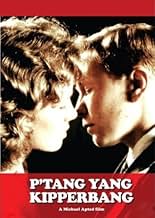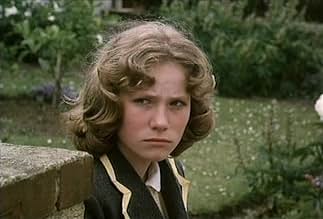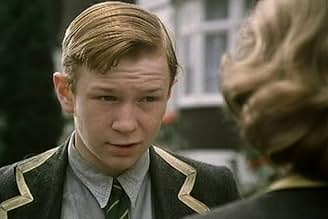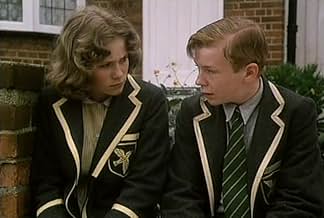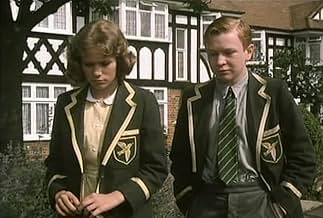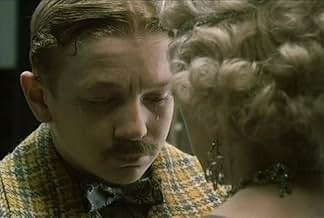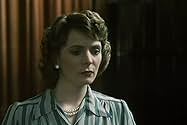IMDb-BEWERTUNG
7,1/10
1106
IHRE BEWERTUNG
Füge eine Handlung in deiner Sprache hinzuIn 1948, a socially awkward cricket-obsessed London schoolboy wants to kiss a classmate, his co-star in a play.In 1948, a socially awkward cricket-obsessed London schoolboy wants to kiss a classmate, his co-star in a play.In 1948, a socially awkward cricket-obsessed London schoolboy wants to kiss a classmate, his co-star in a play.
- Regie
- Drehbuch
- Hauptbesetzung
- Nominiert für 3 BAFTA Awards
- 3 Nominierungen insgesamt
Christopher Karallis
- Shaz
- (as Chris Karallis)
John Arlott
- Self - Cricket Commentator
- (Synchronisation)
Empfohlene Bewertungen
This sweet, breezy, coming of age/first kiss movie follows the trials and tribulations of Alan "Quack-Quack" Duckworth, a likable young teenager going through his first crush. Set in post WWII Britian, Alan has his public love of Cricket, and his secret puppy-love for classmate Ann Laughton, who barely tolerates his existence. And just as Baseball (or Cricket) can throw you a curve ball, Alan gets his curve ball in the the form of an iron-clad opportunity to kiss the girl of his dreams. But will "Quack-Quack" be able to step up to the plate and fulfill his dream? Well, get a hold of this little gem of a movie and find out. Great supporting cast of his Teacher and Headmaster, his schoolyard chums, and Tommy the Groundskeeper , whom Alan admires, but whom might throw Alan yet another curve ball. All in all, an entertaining movie that I highly recommend.
My review was written in February 1984 after watching the film at a Midtown Manhattan screening room.
"Kippebang" is a flat, understated attempt at romantic comedy, made for British television in 1982 as part of the "First Love" series, but virtually evaporating on the big screen. U. S. Theatrical release via UA Classics comes several months after the picture in video cassette form has been available in domestic video stores.
Writer Jack Rosenthal's consistently precious script matches the romantic problems of young adolescents (hero is 14) with those of their elders, as the English teacher (Alison Steadman) must deal with an unplanned pregnancy,l the father being the school groundskeeper (Garry Cooper).
Very thin material emphasizes running gags, most noxious of which is the kids reciting the nonsense phrase "P'tang, Yang, Kipperbang" (pic's original title in Britain, pointlessly followed by a grunt, shortened for U. S. release), as an example of the youngsters' codes and rituals.. Young cast members throw away their dialog in mumbled, naturalistic readings, reducing potential chuckles to groaners.
Plot gimmicks, generally overemphasized, include the hero Alan (John Albasiny) dreaming of his first kiss with plain classmate Ann (Abigail Gruttenden), with attempted suspense generated as he is cast in a dull school play in which he is supposed to kiss co-star Ann in the final scene.
Device of a voiceover narrator turning most events into cricket match play-by-play (representing Alan's wish-fulfillment point-of-view) is overworked, as are the frequent references back to World War II (groundskeeper is fake war hero, leading to the predictable disillusionment of the hero).
Director Michael Apted appears uncertain how to approach this material, combining the general understatement with a coy approach to vulgar issues of adolescent sexs (Alan and his two pals form the inevitable central trio of sex-obsessed young teens) and hyped-up crosscutting between the school play's climax and police arresting the groundskeeper.
Adult actors, especially Steadman, turn in good performances, but the kids are a drag. In his big finale scene, pouring his heart out to Ann, John Albasiny delivers his lines into the ground, inadvertently giving a worse performance than his intentionally incompetent non-acting during the school play. Tech credits are okay.
"Kippebang" is a flat, understated attempt at romantic comedy, made for British television in 1982 as part of the "First Love" series, but virtually evaporating on the big screen. U. S. Theatrical release via UA Classics comes several months after the picture in video cassette form has been available in domestic video stores.
Writer Jack Rosenthal's consistently precious script matches the romantic problems of young adolescents (hero is 14) with those of their elders, as the English teacher (Alison Steadman) must deal with an unplanned pregnancy,l the father being the school groundskeeper (Garry Cooper).
Very thin material emphasizes running gags, most noxious of which is the kids reciting the nonsense phrase "P'tang, Yang, Kipperbang" (pic's original title in Britain, pointlessly followed by a grunt, shortened for U. S. release), as an example of the youngsters' codes and rituals.. Young cast members throw away their dialog in mumbled, naturalistic readings, reducing potential chuckles to groaners.
Plot gimmicks, generally overemphasized, include the hero Alan (John Albasiny) dreaming of his first kiss with plain classmate Ann (Abigail Gruttenden), with attempted suspense generated as he is cast in a dull school play in which he is supposed to kiss co-star Ann in the final scene.
Device of a voiceover narrator turning most events into cricket match play-by-play (representing Alan's wish-fulfillment point-of-view) is overworked, as are the frequent references back to World War II (groundskeeper is fake war hero, leading to the predictable disillusionment of the hero).
Director Michael Apted appears uncertain how to approach this material, combining the general understatement with a coy approach to vulgar issues of adolescent sexs (Alan and his two pals form the inevitable central trio of sex-obsessed young teens) and hyped-up crosscutting between the school play's climax and police arresting the groundskeeper.
Adult actors, especially Steadman, turn in good performances, but the kids are a drag. In his big finale scene, pouring his heart out to Ann, John Albasiny delivers his lines into the ground, inadvertently giving a worse performance than his intentionally incompetent non-acting during the school play. Tech credits are okay.
There is a great danger when you watch a film that had had such a profound affect on you the first time around , that 20 years later , it wont hold the same magic as it did before. I must admit i wasnt expecting it to be as good as i remembered but a was pleasently suprised. P'tang Yang Kipperbang is still as fantastic as i remember it when i was a 12 year old .This film has a certain type of brilliance that not many films possess. It is engrossing , it is briliantly acted and best of all it makes me feel like a kid again and there isnt many things that can do that. John Albasiny and Abigail Cruttenden's rolls in this film are 1st class and i had forgotten how good they were until now. I urge any parent of teenagers to sit them down and watch this and see if it has the same affect on them as it did on me. P'TANG YANG KIPPERBANG EEHHH! 10 out of 10.
I was at school in the late sixties and early seventies and this film is very much how my school was. The school play where the leading actors kiss, that happened at my school. A crazy gang of lads, my school again only when we went on a cross country run we would have a smoke! 'Getting the whack', some one at my school broke in through a sky light and broke the canes! after that they were kept in a safe!!! And as for certain nocternal activities! what can I say.... The film actually came out in 1982, I remember that as it was when I bought my house and the film was showing at the same time. If you like British films and films about school, growing up and period pieces, then this is for you. Another film very much like it, 'SWALK', came out a few years before and I for one would like to see that again, also 'Kes' is in the genre. Highly recommended. (But trust me, 1982 is when it came out)
Through their collaborations on TV in the 1960s and 1970s, writer Jack Rosenthal and director Michael Apted had crafted a number of popular and acute studies of human character through plays, sitcoms and even episodes of Coronation Street. Little wonder then that by the 1980s when the new fourth British television channel was being planned, that these two talents should be earmarked for the first project of its film wing.
Rosenthal returns to the landscape of his own youth for this story, a middle-class British school of the 1940s. In simple terms, it is the story of a fourteen-year-old boy, Alan Duckworth, and his two great loves: a very public passion for cricket and a more private, unrequited adoration of one of his female classmates, Ann Lawton. In the transitional stage between childhood and adulthood, he is able to maintain a friendship with the school groundsman, Tommy, and discuss intelligent topics with him, yet is still something of an unruly pupil, larking about with his 'gang' friends at inappropriate moments. It is the club greeting of this gang, an obligatory exchange of the password "P'Tang, Yang, Kipperbang - uhh!" that gives this film its title, one to rank among the most bizarre in the history of cinema along with Laughing Gravy (1930) and The Film That Rises To The Surface Of Clarified Butter (1968).
Duckworth's growing infatuation with Ann seems doomed to progress no further than longing gazes across the classroom until an unexpected turn of events propels him along a course whereupon it seems inevitable that he must declare his feelings to her. However, as this is a course of action he is now being pressured into, he begins to wonder if asking God to bring him this opportunity was such a good idea after all.
But this is a Jack Rosenthal script, so although this tale of adolescence is told in a quite charming way, there is so much more going on in the film and it explores love and sex as driving forces for most of the other characters in the film also, and how it differs for each. Tommy, recently back from serving overseas during the war, is now working the land at the school and has also been 'working' Miss Land, Alan's teacher. Miss Land, rather prim and proper in class, has quite an appetite for men, and when all the young eligible ones were away fighting it is revealed that she took on older men for lovers rather than remain celibate. The boys in Alan's class have reached an age where they want sex but haven't achieved it, and thus even a claim to have groped a girl's chest over her clothes affords a boy some superior status over his peers. But even the girls seem rather obsessed too, having a poll to see which is the most desirable boy in the class. The juxtaposition of these events help to illustrate that Alan is truly motivated more by love than mere lust. And just as they also demonstrate a depth to Alan, the events also show this unexpected depth of Alan's character to Ann Lawton, who had never previously given him a second thought.
There's a top-notch cast at work here, many of them just starting out on what have turned out to be successful screen careers. Watch out for one-time Eurovision entrant Frances Ruffelle as the girl who offers out hugs for all the boys in the class.
The film is not full of action or incident and although it explores some adult themes, it is subtle rather than explicit. As a snapshot of British life just after the war, I am not sure how much this will appeal to audiences of different ages or from different cultures but as its themes are so fundamentally human, the underlying story should surely be appreciated universally. And in its approach to exploring those themes, the film is practically faultless.
Rosenthal returns to the landscape of his own youth for this story, a middle-class British school of the 1940s. In simple terms, it is the story of a fourteen-year-old boy, Alan Duckworth, and his two great loves: a very public passion for cricket and a more private, unrequited adoration of one of his female classmates, Ann Lawton. In the transitional stage between childhood and adulthood, he is able to maintain a friendship with the school groundsman, Tommy, and discuss intelligent topics with him, yet is still something of an unruly pupil, larking about with his 'gang' friends at inappropriate moments. It is the club greeting of this gang, an obligatory exchange of the password "P'Tang, Yang, Kipperbang - uhh!" that gives this film its title, one to rank among the most bizarre in the history of cinema along with Laughing Gravy (1930) and The Film That Rises To The Surface Of Clarified Butter (1968).
Duckworth's growing infatuation with Ann seems doomed to progress no further than longing gazes across the classroom until an unexpected turn of events propels him along a course whereupon it seems inevitable that he must declare his feelings to her. However, as this is a course of action he is now being pressured into, he begins to wonder if asking God to bring him this opportunity was such a good idea after all.
But this is a Jack Rosenthal script, so although this tale of adolescence is told in a quite charming way, there is so much more going on in the film and it explores love and sex as driving forces for most of the other characters in the film also, and how it differs for each. Tommy, recently back from serving overseas during the war, is now working the land at the school and has also been 'working' Miss Land, Alan's teacher. Miss Land, rather prim and proper in class, has quite an appetite for men, and when all the young eligible ones were away fighting it is revealed that she took on older men for lovers rather than remain celibate. The boys in Alan's class have reached an age where they want sex but haven't achieved it, and thus even a claim to have groped a girl's chest over her clothes affords a boy some superior status over his peers. But even the girls seem rather obsessed too, having a poll to see which is the most desirable boy in the class. The juxtaposition of these events help to illustrate that Alan is truly motivated more by love than mere lust. And just as they also demonstrate a depth to Alan, the events also show this unexpected depth of Alan's character to Ann Lawton, who had never previously given him a second thought.
There's a top-notch cast at work here, many of them just starting out on what have turned out to be successful screen careers. Watch out for one-time Eurovision entrant Frances Ruffelle as the girl who offers out hugs for all the boys in the class.
The film is not full of action or incident and although it explores some adult themes, it is subtle rather than explicit. As a snapshot of British life just after the war, I am not sure how much this will appeal to audiences of different ages or from different cultures but as its themes are so fundamentally human, the underlying story should surely be appreciated universally. And in its approach to exploring those themes, the film is practically faultless.
Wusstest du schon
- WissenswertesOne of the very first Film4 productions, an offshoot of the UK's then new Channel 4 which essentially revolutionized the British film industry by making a series of relatively cheap films which would air on the TV channel several months after their cinema release. This new style of production brought such resounding successes as Paris, Texas (1984), Brief an Breshnew (1985), Mein wunderbarer Waschsalon (1985), Vier Hochzeiten und ein Todesfall (1994), East Is East (1999) and 12 Years a Slave (2013).
- PatzerWhen Alan, Ann and Geoffrey walk home from school after rehearsing for the school play, the top deck of a modern (probably late 1970s) double-decker bus is visible at the far end of the alley. In the same scene, opposite the side-road that leads to the alley, is a modern Warboys-design (post-1964) "no cycling" sign.
- VerbindungenFeatured in Timeshift: Jack Rosenthal: The Voice of Television Drama (2004)
Top-Auswahl
Melde dich zum Bewerten an und greife auf die Watchlist für personalisierte Empfehlungen zu.
Details
- Erscheinungsdatum
- Herkunftsland
- Sprache
- Auch bekannt als
- First Love: P'tang, Yang, Kipperbang
- Drehorte
- Produktionsfirmen
- Weitere beteiligte Unternehmen bei IMDbPro anzeigen
Zu dieser Seite beitragen
Bearbeitung vorschlagen oder fehlenden Inhalt hinzufügen


